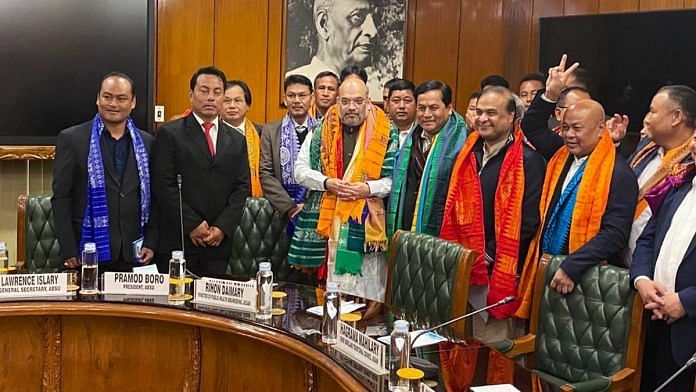Guwahati: The Assam government Wednesday decided to bring in an ordinance to grant official status to the Bodo language. The cabinet also approved an ordinance to create a Bodo Kachari Autonomous Welfare Council outside the Sixth Schedule areas for the Bodo community.
The move is seen as an attempt by the state government to appease the Bodos, while gradually fulfilling the promises made by the Modi government during the signing of the third Bodo accord on 27 January.
The Assam cabinet Wednesday also resolved to request the State Election Commission to schedule the much-talked about Bodoland Territorial Council (BTC) elections for December this year.
The elections were to be held on 4 April but were postponed due to the Covid-19 pandemic. The 40-member tribal council, established in 2003 under the Sixth Schedule of the Constitution, looks after the administrative affairs of the four Bodoland Territorial Area Districts (BTAD) districts of Baksa, Chirang, Kokrajhar and Udalguri, all of which have a sizeable population of the Bodo community in Assam, the largest plains tribe in the Northeast.
The current BTC’s five-year term ended on 27 April. Assam Governor Jagdish Mukhi currently leads the caretaker government but his rule ends on 27 October.
All of the Assam government’s moves bring the focus back on the three-decade struggle of the Bodos to create a separate homeland in the state. ThePrint explains.
Also read: Congress and AIUDF inching closer to Assam alliance, announcement expected soon
The Bodos
The Bodos are considered to be the earliest indigenous inhabitants of the Brahmaputra valley having their own kingdom, religion, culture and language. There are different opinions by historians regarding the origin of Bodos, with many saying that the term ‘Bodo’ is derived from the Tibetian word ‘Bod’ — meaning homeland.
According to historians, they belong to the Tibeto-Burman family of the Mongoloid race. Their population is concentrated mostly on the North bank of the Brahmaputra river, in western and parts of Central Assam, the northern part of West Bengal and in some parts of Bhutan and Nepal, Arunachal Pradesh and Nagaland.
The traditional religion of the Bodos is Bathouism — they traditionally worship Bathou-Borai, often identified as the Hindu God Shiva.
The Bodoland movement
The Bodoland movement started as a political, socio-political and economic movement of the Bodo tribe. Former All Bodo Students’ Union (ABSU) president Bodofa Upendranath Brahma had ignited the movement for Bodoland in 1987.
Brahma had in that year submitted a 92-point charter of demands to the then chief minister of Assam, Prafulla Kumar Mahanta. Of these 92 demands, three demands were political and the last demand was for creation of a separate state. The other demands were related to socio-economic conditions and education, among others. These demands were placed before the then Prime Minister Rajiv Gandhi, Home Minister Buta Singh and President Giani Zail Singh.
Brahma then formed the Bodo People Action Committee (BPAC) at a conference at Dotma (Kokrajhar district) in November 1988. Reports say that during the ABSU (Upen Brahma)-led movement, “quit notices” were issued to the non-Bodo population in Kokrajhar and Udalguri sub-divisions, indicating that the land factor was of predominant importance in the agitation.
The militant group, National Democratic Front of Boroland (NDFB), was formed as the Bodo Security Force in 1986. The current name was adopted in 1994 after the group rejected the Bodo accord signed between the government of India and the ABSU-BPAC.
The movement took a bloody turn by the end of eighties as Bodos became even more determined to secure a separate state — bandhs, strikes, rallies and demonstrations were observed both in Assam and New Delhi. Eventually, it led to armed militancy.
Agitations and large scale riots took place in 1994, 1996, and 2014 as the Bodos continued to fear they would be reduced to a minority in their own homeland.
But since the signing of the third Bodo accord in January this year, the Assam government maintains that leaders of the community have left out their demand for a separate state of Bodoland.
The Third Bodo Accord
New Delhi has many a time reassessed the Bodo stir — the first Bodo accord was signed between ABSU-BPAC and the Government of India in February 1993, leading to the creation of a Bodoland Autonomous Council (BAC) that enjoyed limited political power.
It encompassed 2,570 villages of seven Assam districts. The central and state governments had then declared that with the accord, the Bodo issue had been resolved. But with the demand for a separate state not fulfilled, the issue remained alive.
The second Bodo accord was signed in 2003 with the insurgent group Bodo Liberation Tigers (BLT), leading to the formation of Bodoland Territorial Council (BTC) for four districts of Assam — Udalguri, Chirang, Kokrajhar and Baksa, collectively called the BTAD.
The first BTC election was held in 2005 when Hagrama Mohilary formed the Bodoland People’s Front (BPF) and was elected as the party’s first president. Mohilary had been the chief executive member of the BTC since its creation until its dissolution in April this year. The BPF is now an ally of the BJP.
The BTAD was rechristened Bodoland Territorial Region (BTR) with the signing of the third Bodo accord on 27 January. The Centre and Assam government signed the accord with the four factions of the NDFB and the ABSU. In this accord, the government has made a provision under the Sixth Schedule of the Constitution to appoint a commission that would recommend the ‘inclusion and exclusion’ of villages under BTR.
Also read: Naga leaders can be convinced to agree with Centre, says ex-chief of peace keeping body



